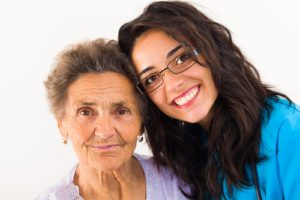Helping your Parent with Mobility Problems

Elder Care in East Meadow NY: Helping your Parent with Mobility Problems
As your parent ages, you may notice their body posture changing. Their shoulders start to drift forward and their feet begin to shuffle. As a family caregiver, now is the time to step in and address their need for mobility support and strengthening programs that can help them remain active and engaged well into their elderly years. Nothing short of the quality of their life is at stake.
Mobility Problems
There are numerous diseases and lifestyle choices that can affect one’s mobility. These include diabetes, heart disease, cancer, arthritis and neurological conditions. Lack of exercise can lead to loss of flexibility, strength and balance. A catch-22 can occur in which your parent’s chronic pain decreases their desire to exercise on a regular basis which in turn increases their pain and decreases their strength and stamina.
Caregiver to the Rescue
As a family caregiver, providing support and encouragement is an important part of the role you have acquired. In order to accomplish this, consider the following when addressing mobility issues.
- Falls are the number one cause of fractures in the elderly. One-third of the population over the age of 65 fall every year and about half of those who are discharged for fall-related hip fractures will experience another fall in six months. To limit your parent’s chances of taking a tumble, make their home environment as safe as possible. This includes removing throw rugs, obstacles along common pathways, ensuring good lighting throughout the home, and installing grab bars and non-skid mats in strategic locations. Your loved one’s physical strength and stamina also has a lot to do with their ability to limit falls and the seriousness of the injury should a fall occur.
- To improve mobility, strength, flexibility and balance, be sure to encourage your loved one to exercise at least 30 minutes a day for most days of the week. If their fear of falling keeps them immobile, talk to their primary health care provider about your concerns and ask them if a physical therapist could assist in developing an exercise program for them. Exercising in the pool also reduces the fear associated with falling as well as decreasing the pressure and pain on stiff joints. Many YMCA’s and local senior community centers offer water aerobics designed specifically for seniors. They also offer tai chi, an exercise that is good for both strength and balance.
- Elder Care Provider. An elder care provider can assist with the daily activities of living. They can also accompany your parent on daily walks and provide transportation to classes and appointments. They can provide the companionship and care so important to the safety and quality of life of the aging population.
If you or an aging loved one are considering elder care in East Meadow, NY, please contact the caring staff at Family First Home Companions. Serving all of Long Island. Call today: (631) 319-3961
Resources
http://www.learnnottofall.com/content/fall-facts/how-often.jsp
http://www.healthinaging.org/resources/resource:eldercare-at-home-mobility-problems/
- Caregiver of the Month: Kathy - April 8, 2022
- Preventing Colds and Flu in Springtime - March 2, 2022
- Caregiver of The Month: Jacqueline B - February 21, 2022
